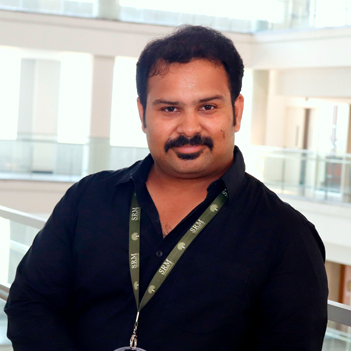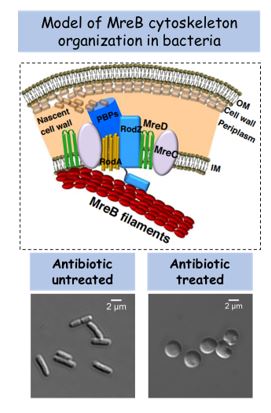Alleviating healthcare challenges by augmenting efficacy of antibiotics
 Dr Sutharsan Govindarajan, Assistant Professor, Department of Biological Sciences, SRM University – AP, Andhra Pradesh received an outlay of Rs 55 lakhs by the Department of Science and Technology (DST)- Science and Engineering Research Board (SERB), Government of India to advance the project “Mechanistic understanding of bacterial cytoskeleton inhibition by antibiotics and novel bacteriophage proteins”. The research grant is provided to support active researchers in undertaking research and development in the frontiers of Science and Engineering. Dr Sutharsan exclaims, “It is thrilling to see that my proposal has been accepted for funding. This is a huge recognition for the science that we do at SRM University – AP. Through this funding, I will be able to establish an independent molecular microbiology lab at the university.”
Dr Sutharsan Govindarajan, Assistant Professor, Department of Biological Sciences, SRM University – AP, Andhra Pradesh received an outlay of Rs 55 lakhs by the Department of Science and Technology (DST)- Science and Engineering Research Board (SERB), Government of India to advance the project “Mechanistic understanding of bacterial cytoskeleton inhibition by antibiotics and novel bacteriophage proteins”. The research grant is provided to support active researchers in undertaking research and development in the frontiers of Science and Engineering. Dr Sutharsan exclaims, “It is thrilling to see that my proposal has been accepted for funding. This is a huge recognition for the science that we do at SRM University – AP. Through this funding, I will be able to establish an independent molecular microbiology lab at the university.”
While the entire world is aggressively working to end the menace of COVID19, antimicrobial resistance has been a long-standing unsolved threat. This project is dedicated to interpreting the mechanism of inhibition of bacterial cytoskeleton by antibiotics, which has an immediate impact on the society as it strives to unravel the mystery of ‘how bacteria are able to outsmart antibiotics and survive’. In this project, Dr Sutharsan will be probing antibiotics to comprehend the response of bacteria to them. The scholar says, “Currently, antibiotic resistance is one of the greatest health care challenges of this century leading to serious clinical manifestations. In countries like India, the situation is alarming since nearly 58 thousand new-born babies are dying every year due to bacteria escaping the antibiotics.”
 Dr Sutharsan informs, “Largely, solutions to antibiotic resistance problem is directed towards discovering new antibiotics and therapies. However, there are hundreds of existing antibiotics that could be made more effective to kill bacteria. But these antibiotics are not considered as compelling options in the market due to their poor efficiency or lack of understanding. In this project, we will investigate one such antibiotic and attempt to assess its response to the killing agent. By understanding how bacteria escape the antibiotic action, we hope to find effective strategies to combat them.”
Dr Sutharsan informs, “Largely, solutions to antibiotic resistance problem is directed towards discovering new antibiotics and therapies. However, there are hundreds of existing antibiotics that could be made more effective to kill bacteria. But these antibiotics are not considered as compelling options in the market due to their poor efficiency or lack of understanding. In this project, we will investigate one such antibiotic and attempt to assess its response to the killing agent. By understanding how bacteria escape the antibiotic action, we hope to find effective strategies to combat them.”
The laboratory of phage-bacteria interaction will be established and led by Dr Sutharsan at SRM University-AP, where he will be relentlessly working on various aspects of bacteriology including antibiotic resistance, bacteriophage engineering, and therapy. Sharing his plans of advancing the work, Dr Sutharsan says “In the near future, we are planning to connect with the clinicians and explore the possibility of taking our research findings to actual patients – a bench to bedside model of research.”

